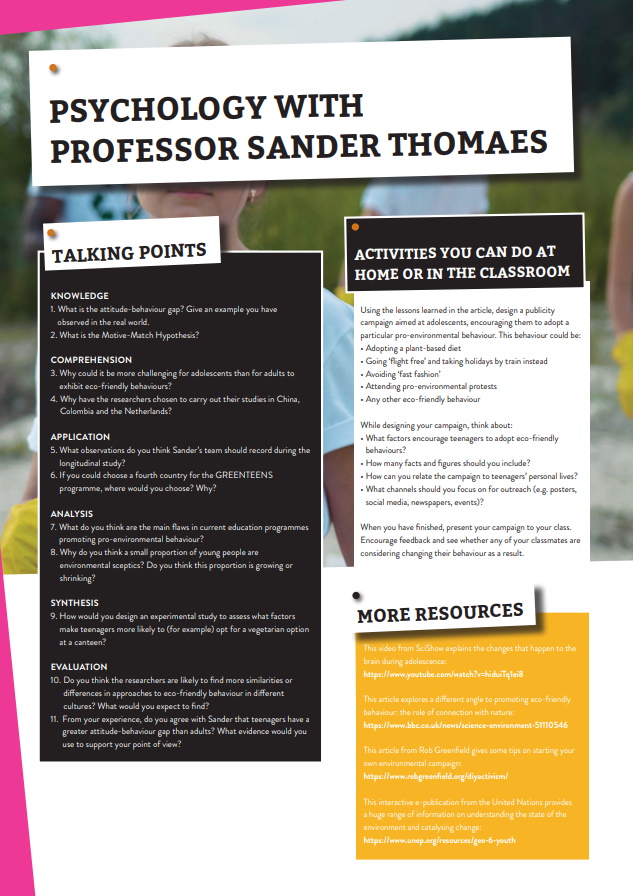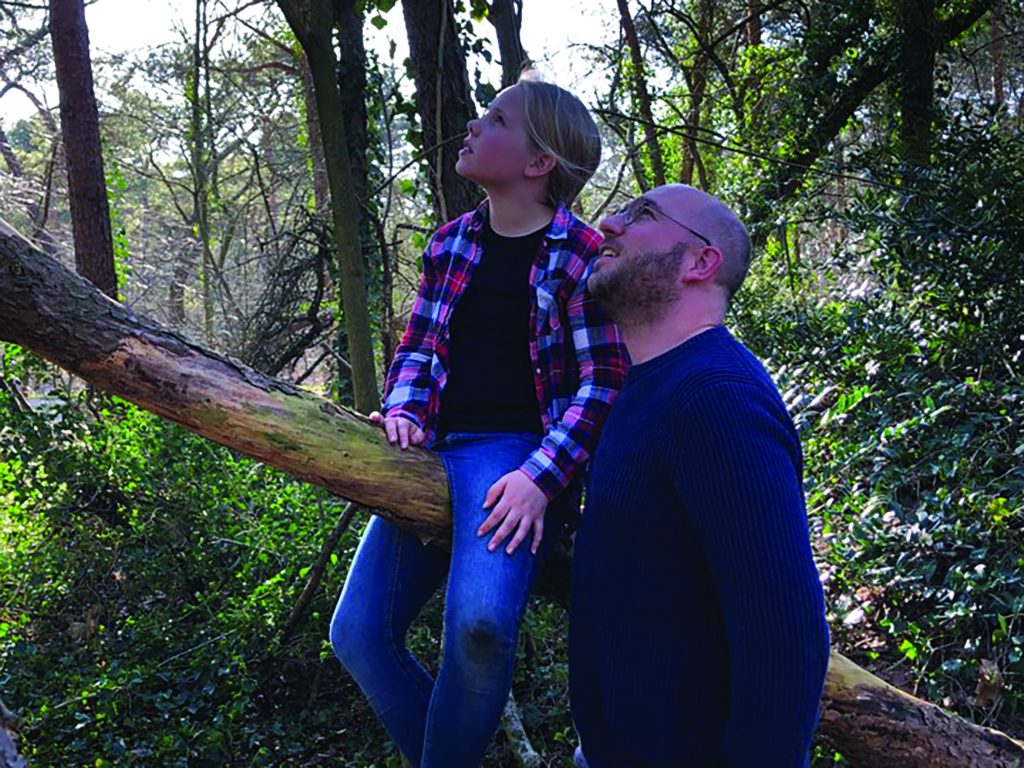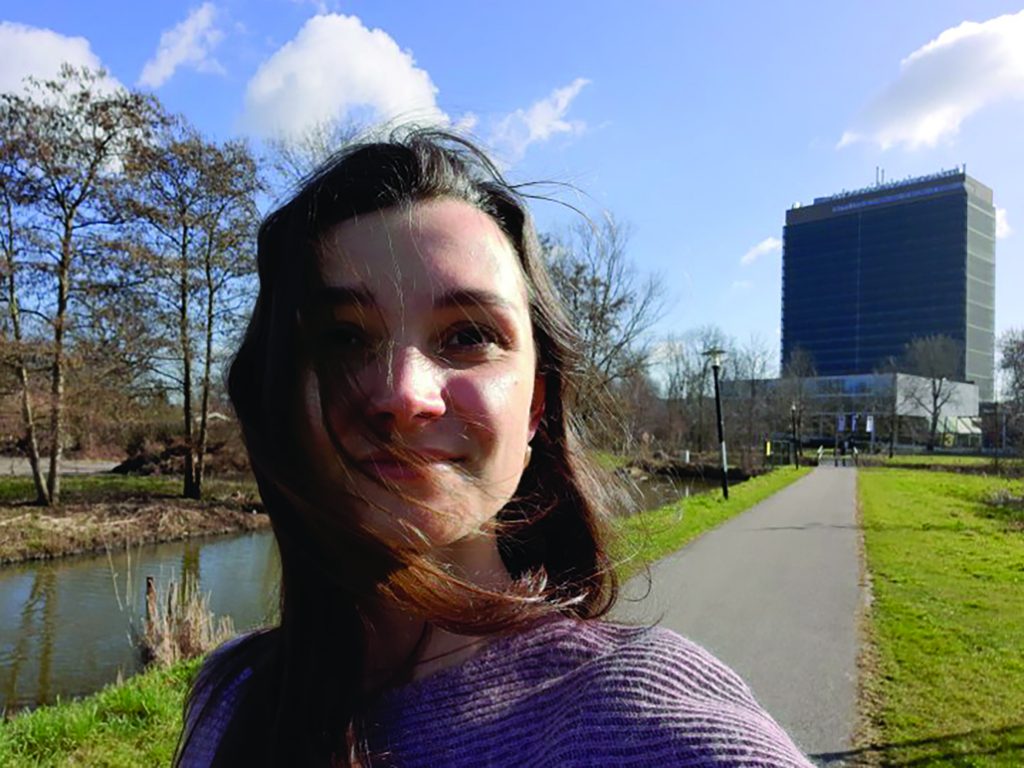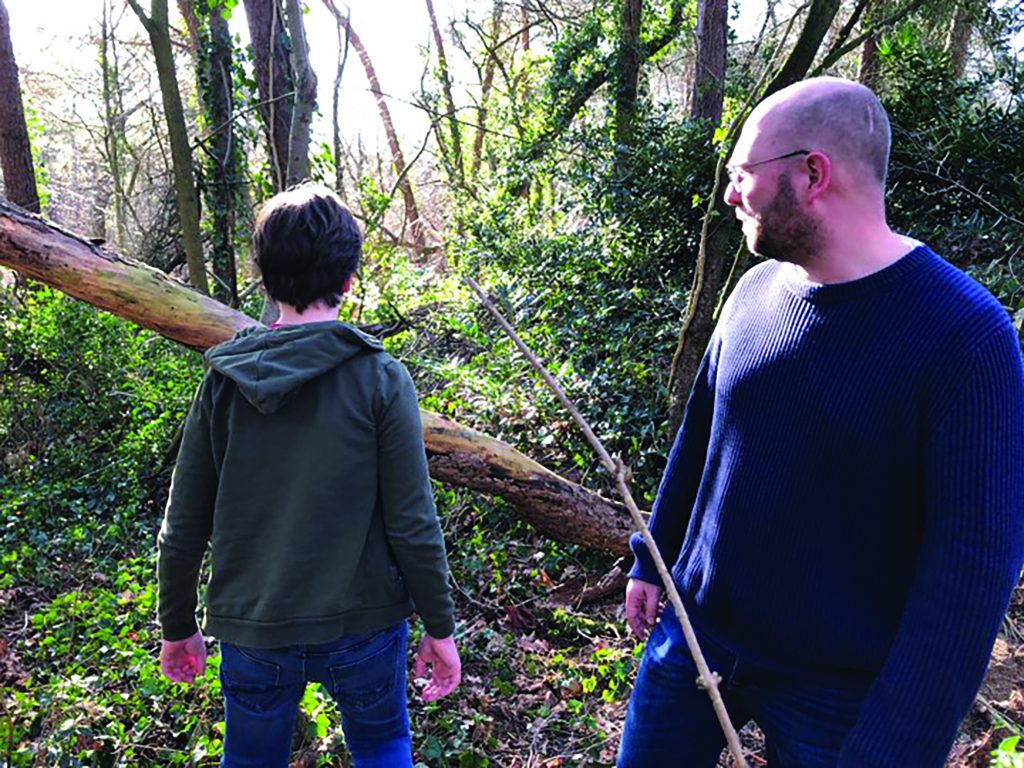Greenteens: unleashing teenagers’ eco-friendly behaviour
Teenagers often feel passionately about environmental issues, but it can be hard to act on these concerns. Professor Sander Thomaes, from Utrecht University in the Netherlands, is leading an international programme to uncover what motivates teenagers and how this can lead to the start of lifelong eco-friendly habits
TALK LIKE A PSYCHOLOGIST
ATTITUDE-BEHAVIOUR GAP – the space between someone’s values (attitudes) and their actions (behaviour)
EXPERIMENTAL STUDY – a study where researchers change a particular variable and measure the effects of this change
LONGITUDINAL STUDY – a study that observes the same participants at various stages over a long period of time
MOTIVE-MATCH HYPOTHESIS – the idea that values are more likely to lead to behavioural change if they are relevant to one’s personal life
PSYCHOLOGY – the study of how the human mind works and influences behaviour
“Some people think that teenagers do not care about societal problems. This belief is a myth.” So states Sander Thomaes, a Professor of Developmental Psychology at Utrecht University in the Netherlands. He is leading the ‘GREENTEENS’ programme, an international collaborative effort that is examining what influences teenagers to take up eco-friendly behaviours.
“Many adolescents really care about the environment. For example, a recent survey from the United Nations and University of Oxford found that two out of three teenagers consider climate change a global emergency,” says Sander. “However, it can be hard to act on these concerns, and this can be especially true for adolescents.”
Sander is talking about what psychologists call the ‘attitude-behaviour gap’ – the difference between our values and how we act in real life. This is especially evident for environmental matters; think about how we might set our eco-friendly values aside when we take a flight abroad or eat a steak. For teenagers, there are many factors that make following through on their eco-friendly values particularly difficult. “Many adolescents are grappling with pressing questions, especially about finding their own sense of identity and their place in the world,” says Sander. “It is hard to make societal concerns a priority when there are so many important things happening in your personal life.”
ADOLESCENTS EXPLAINED
How to encourage people to adopt eco-friendly lifestyles is a question that has plagued scientists for decades. For a long time, it was assumed that if people possessed the facts – about the effects of climate change, for instance – they would change their behaviour accordingly. But this has not been the case. Sander’s team conducted a meta-analysis as a preliminary to their research to find out why this is so. “Many adolescents do not like being told what to think or do,” says Sander. “If they are taught information, they are already familiar with then efforts can even backfire, if they feel they are being patronised. The meta-analysis confirmed this and highlighted there is much room for improvement in education programmes.”
While teenagers remain a mystery for many adults, psychologists know of a few key adolescent traits to bear in mind. “Most teenagers want to be autonomous,” says Sander. “They want to make their own decisions on issues that matter to them. This is partly rooted in hormonal changes, in particular testosterone increases (in both boys and girls), as well as a growing sense of identity.” Teenagers are also particularly driven by status – they find it important to be valued or respected by their peers. This is true of almost all people, of course, but it is especially relevant during one’s teenage years when one’s place in the world is being established.
THE MOTIVE-MATCH HYPOTHESIS
“Our research, as well as that of others, has found that adolescents are especially motivated to act on their concerns about societal issues if these actions are directly relevant to their personal lives,” says Sander. “For instance, concern for the environment can materialise through protests, which can be especially appealing to those who feel it ties into their identity – being an independent-minded person who stands up to irresponsible authority figures.”
Sander calls this effect the Motive-Match Hypothesis. “Adolescents will be more likely to engage in sustainable behaviour if it supports their sense of identity or is respected by their peers,” says Sander. “Otherwise, even if they believe that sustainable behaviour is important, it becomes a chore.” This has big implications for the design of educational programmes and publicity campaigns. “Current educational programmes do not always tap into that dedication to protecting the planet that many teenagers naturally have,” says Sander.
THE GREENTEENS PROGRAMME
Understanding the Motive-Match Hypothesis is therefore crucial for designing education and outreach programmes that inspire teenagers to action. Sander’s team will tackle this through coordinating a range of different studies under the GREENTEENS umbrella, all of which aim to provide a piece of the puzzle. The research will take place in three geographically and culturally diverse countries: China, Colombia and the Netherlands. “This will allow us to detect differences and similarities in what motivates adolescents of different countries towards eco-friendly behaviour,” says Sander.
The studies they plan to carry out have a range of methodologies. One is a longitudinal study, which sees how participants’ eco-friendly behaviour changes over the course of two years, as they grow older and their sense of identity becomes more defined. They will also carry out a number of experimental studies, seeing what conditions lead to instances of more sustainable behaviour. They will also investigate why some adolescents think climate change is not real or not important, analysing the roles of personal values, lack of knowledge, or parental influence in environmental scepticism.
“Regardless of where adolescents live, they care about developing autonomy and being respected by their peers,” says Sander. “However, we cannot assume the Motive- Match Hypothesis will apply the same around the world, which is why we are testing it with participants from three continents.”
DEPLOYING THE PROJECT
This GREENTEENS project is only just beginning, so there is much for Sander to look forward to as a researcher. “In particular, I am excited about working with the team,” he says. “The other scientists involved – Astrid Poorthuis, Judith van de Wetering, and Stathis Grapsas – all bring their own expertise and skills. It is sometimes thought that scientists work by themselves, but the opposite is true. Science almost always requires teamwork and that is often what makes it so rewarding.” The emphasis on collaboration and teamwork does not stop there. Sander explains, “We are also asking teenagers to give feedback on our research design before we roll it out, so I am looking forward to seeing their comments about how to make sure the project really resonates with participants.”
The hope is that the GREENTEENS project should provide critical insights to help educators and policymakers design education programmes and publicity campaigns that motivate adolescents. “Recent decades have shown that people find it difficult to treat the planet in a sustainable way,” says Sander. “And yet, most of us – perhaps, especially young people – have good intentions at heart. I hope that GREENTEENS will show us how to fill the ‘missing link’ between good intentions and collective behaviour change. Given their capacity for rapid learning and adaptation, teenagers have the potential to spearhead this movement – and we must harness this potential as much as we can.”
 PROFESSOR SANDER THOMAES
PROFESSOR SANDER THOMAES
Professor of Developmental Psychology
Utrecht University, The Netherlands
FIELD OF RESEARCH: Psychology
RESEARCH PROJECT: GREENTEENS, an international programme investigating how to motivate adolescents to adopt sustainable behaviours.
FUNDER: European Research Council (ERC)
This article covers a research project that has received funding from the European Research Council (ERC) under the Horizon 2020 research and innovation programme
Reference
https://doi.org/10.33424/FUTURUM119
ATTITUDE-BEHAVIOUR GAP – the space between someone’s values (attitudes) and their actions (behaviour)
EXPERIMENTAL STUDY – a study where researchers change a particular variable and measure the effects of this change
LONGITUDINAL STUDY – a study that observes the same participants at various stages over a long period of time
MOTIVE-MATCH HYPOTHESIS – the idea that values are more likely to lead to behavioural change if they are relevant to one’s personal life
PSYCHOLOGY – the study of how the human mind works and influences behaviour
“Some people think that teenagers do not care about societal problems. This belief is a myth.” So states Sander Thomaes, a Professor of Developmental Psychology at Utrecht University in the Netherlands. He is leading the ‘GREENTEENS’ programme, an international collaborative effort that is examining what influences teenagers to take up eco-friendly behaviours.
“Many adolescents really care about the environment. For example, a recent survey from the United Nations and University of Oxford found that two out of three teenagers consider climate change a global emergency,” says Sander. “However, it can be hard to act on these concerns, and this can be especially true for adolescents.”
Sander is talking about what psychologists call the ‘attitude-behaviour gap’ – the difference between our values and how we act in real life. This is especially evident for environmental matters; think about how we might set our eco-friendly values aside when we take a flight abroad or eat a steak. For teenagers, there are many factors that make following through on their eco-friendly values particularly difficult. “Many adolescents are grappling with pressing questions, especially about finding their own sense of identity and their place in the world,” says Sander. “It is hard to make societal concerns a priority when there are so many important things happening in your personal life.”
ADOLESCENTS EXPLAINED
How to encourage people to adopt eco-friendly lifestyles is a question that has plagued scientists for decades. For a long time, it was assumed that if people possessed the facts – about the effects of climate change, for instance – they would change their behaviour accordingly. But this has not been the case. Sander’s team conducted a meta-analysis as a preliminary to their research to find out why this is so. “Many adolescents do not like being told what to think or do,” says Sander. “If they are taught information, they are already familiar with then efforts can even backfire, if they feel they are being patronised. The meta-analysis confirmed this and highlighted there is much room for improvement in education programmes.”
While teenagers remain a mystery for many adults, psychologists know of a few key adolescent traits to bear in mind. “Most teenagers want to be autonomous,” says Sander. “They want to make their own decisions on issues that matter to them. This is partly rooted in hormonal changes, in particular testosterone increases (in both boys and girls), as well as a growing sense of identity.” Teenagers are also particularly driven by status – they find it important to be valued or respected by their peers. This is true of almost all people, of course, but it is especially relevant during one’s teenage years when one’s place in the world is being established.
THE MOTIVE-MATCH HYPOTHESIS
“Our research, as well as that of others, has found that adolescents are especially motivated to act on their concerns about societal issues if these actions are directly relevant to their personal lives,” says Sander. “For instance, concern for the environment can materialise through protests, which can be especially appealing to those who feel it ties into their identity – being an independent-minded person who stands up to irresponsible authority figures.”
Sander calls this effect the Motive-Match Hypothesis. “Adolescents will be more likely to engage in sustainable behaviour if it supports their sense of identity or is respected by their peers,” says Sander. “Otherwise, even if they believe that sustainable behaviour is important, it becomes a chore.” This has big implications for the design of educational programmes and publicity campaigns. “Current educational programmes do not always tap into that dedication to protecting the planet that many teenagers naturally have,” says Sander.
THE GREENTEENS PROGRAMME
Understanding the Motive-Match Hypothesis is therefore crucial for designing education and outreach programmes that inspire teenagers to action. Sander’s team will tackle this through coordinating a range of different studies under the GREENTEENS umbrella, all of which aim to provide a piece of the puzzle. The research will take place in three geographically and culturally diverse countries: China, Colombia and the Netherlands. “This will allow us to detect differences and similarities in what motivates adolescents of different countries towards eco-friendly behaviour,” says Sander.
The studies they plan to carry out have a range of methodologies. One is a longitudinal study, which sees how participants’ eco-friendly behaviour changes over the course of two years, as they grow older and their sense of identity becomes more defined. They will also carry out a number of experimental studies, seeing what conditions lead to instances of more sustainable behaviour. They will also investigate why some adolescents think climate change is not real or not important, analysing the roles of personal values, lack of knowledge, or parental influence in environmental scepticism.
“Regardless of where adolescents live, they care about developing autonomy and being respected by their peers,” says Sander. “However, we cannot assume the Motive- Match Hypothesis will apply the same around the world, which is why we are testing it with participants from three continents.”
DEPLOYING THE PROJECT
This GREENTEENS project is only just beginning, so there is much for Sander to look forward to as a researcher. “In particular, I am excited about working with the team,” he says. “The other scientists involved – Astrid Poorthuis, Judith van de Wetering, and Stathis Grapsas – all bring their own expertise and skills. It is sometimes thought that scientists work by themselves, but the opposite is true. Science almost always requires teamwork and that is often what makes it so rewarding.” The emphasis on collaboration and teamwork does not stop there. Sander explains, “We are also asking teenagers to give feedback on our research design before we roll it out, so I am looking forward to seeing their comments about how to make sure the project really resonates with participants.”
The hope is that the GREENTEENS project should provide critical insights to help educators and policymakers design education programmes and publicity campaigns that motivate adolescents. “Recent decades have shown that people find it difficult to treat the planet in a sustainable way,” says Sander. “And yet, most of us – perhaps, especially young people – have good intentions at heart. I hope that GREENTEENS will show us how to fill the ‘missing link’ between good intentions and collective behaviour change. Given their capacity for rapid learning and adaptation, teenagers have the potential to spearhead this movement – and we must harness this potential as much as we can.”
 PROFESSOR SANDER THOMAES
PROFESSOR SANDER THOMAES
Professor of Developmental Psychology
Utrecht University, The Netherlands
FIELD OF RESEARCH: Psychology
RESEARCH PROJECT: GREENTEENS, an international programme investigating how to motivate adolescents to adopt sustainable behaviours.
FUNDER: European Research Council (ERC)
This article covers a research project that has received funding from the European Research Council (ERC) under the Horizon 2020 research and innovation programme
ABOUT PSYCHOLOGY
Sander explains more about his subject and his career:
WHAT IS PSYCHOLOGY?
Psychology is the study of how people think, feel, and act. A major challenge and interest point for psychology is that no two individuals are the same. Psychologists study the surprising ways that people are different or similar to one another.
WHAT DO YOU FIND REWARDING ABOUT YOUR WORK?
It is commonly thought that the main aim of psychology is to find cures for mental illnesses, but while this is certainly an important aspect, psychology is much more than that. I enjoy studying the psychological aspects that help people thrive. For instance, adolescents are exceptionally quick and flexible learners and are highly committed to causes they find important.
WHAT TYPES OF COLLABORATION DOES YOUR WORK REQUIRE?
No individual scientist can excel at every aspect of their work. Therefore, it is often a good – and rewarding – idea to work in a team, where each member has their own skillset. For instance, one team member might handle grant writing and getting funding, another data collection, another analysing data and another communicating the team’s findings to the public.
WHAT ISSUES WILL FACE THE NEXT GENERATION OF PSYCHOLOGISTS?
One key flaw of traditional psychological research is that it has been mainly conducted in Western countries. This means we have an incomplete and potentially biased understanding of what it means to be human. I hope that the next generation of psychologists can address this and undertake studies in a wide range of cultures, to make our scientific knowledge more representative of the world population.
• Psychology can be studied at most universities. It is an accessible and popular subject worldwide.
• According to QS World University Rankings, the best universities for psychology are Harvard, Stanford, Cambridge, Oxford and California Berkeley.
• Many universities and scientific institutions offer outreach events. For instance, Utrecht University, where Sander works, hosts an annual ‘Meet the Professor’ event where professors cycle to schools throughout the city to answer questions from students.
• According to Glassdoor, the average annual salary for a psychologist in the Netherlands is around €45k.
At school, studying subjects like biology, chemistry, maths and physics provides a good foundation for any scientific career, psychology included. Given psychology often involves a strong social aspect, other subjects such as English and history can also be useful.
HOW DID SANDER BECOME A PSYCHOLOGIST?
WHAT WERE YOUR INTERESTS AS A CHILD?
I had quite typical childhood interests. As a kid, I loved playing football with friends after school and by the time I was a teenager, I played guitar in a band. I think my mom still has nightmares about my funky haircuts! Although I struggled in some subjects, especially physics and maths, I enjoyed learning, which set me on the path to science.
DO YOU HAVE A FAVOURITE BOOK?
As a teenager I loved Goethe’s ‘The Sorrows of Young Werther’ – even though it’s over 200 years old, I was drawn in by its big emotions, big struggles and big love!
WHAT INSPIRED YOU TO BECOME A SCIENTIST?
I’m inspired by the everyday behaviour of everyday people. I’ve always liked observing people and trying to understand their behaviour – I remember as a child, watching how long it would take my teacher’s smiling face to return to a neutral expression, for instance. Now, as a psychologist, the same applies: asking questions about people and behaviour, trying to learn from it and sharing any discoveries with others.
WHAT ATTRIBUTES HAVE MADE YOU SUCCESSFUL AS A SCIENTIST?
Most scientists, myself included, share three attributes. They are curious, persistent and eager to learn. Not many scientists consider themselves successful – I think because you soon realise how much there is that you don’t know, which is quite humbling.
HOW DO YOU OVERCOME OBSTACLES AT WORK?
I try to think of obstacles in terms of what I can learn from them. In science, difficult problems can be motivating – they offer a rare chance to learn something new or unexpected.
WHAT ARE YOUR PROUDEST ACHIEVEMENTS SO FAR?
The day we got the GREENTEENs research grant was one of the best of my life. It can be quite a struggle to get funding and several previous proposals had been rejected, so I am very thankful it worked out. I now have the chance to do my dream research, which would not have been possible without the support of the grant.
SANDER’S TOP TIPS
01 Find out what makes your heart thump! This is not easy, so take the time you need. Try out many different subjects and extracurricular activities if you get the chance. Read books on topics you find interesting and listen carefully to people whose opinions you value.
02 Realise that setbacks are essential to every learning process. Try to learn from them and move on.
03 One misconception about scientists is that they were always extremely smart, but this is often not necessarily the case. A scientific career is not about how clever you are, but how much you enjoy finding creative ways to learn new things.
Write it in the comments box below and Sander will get back to you. (Remember, researchers are very busy people, so you may have to wait a few days.)













